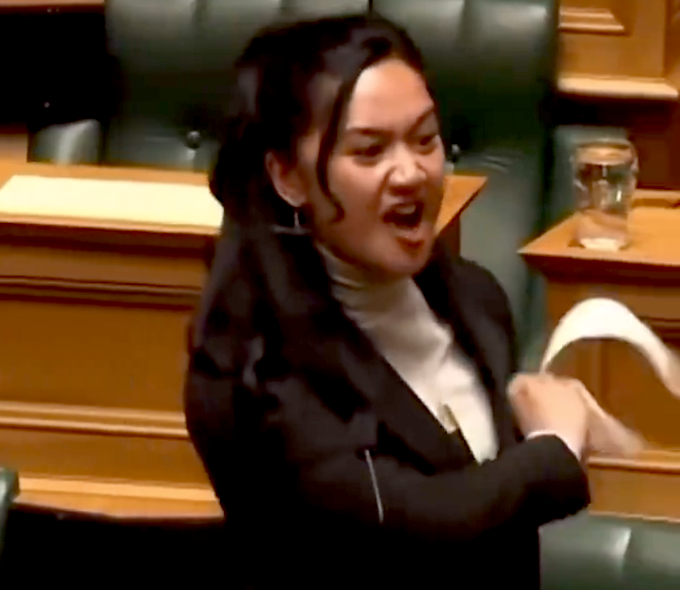
New Zealand’s leading daily newspaper has joined the debate about the haka that stunned Parliament and the nation last week, defending the youngest MP for her actions, saying she is a “product of her forebears” and “shining a light” on the new national conversation about the 1840 Treaty of Waitangi.
That haka has been criticised by some conservative politicians and civic leaders as “appalling behaviour” and led to Te Pāti Māori’s 22-year-old Hana-Rāwhiti Maipi-Clarke being “named” by the Speaker and suspended from the House for 24 hours.
However, among many have rallied to her support across the nation, with The New Zealand Herald declaring in an editorial on Tuesday that her haka “shines the light on a new conversation growing louder daily and describing where many Māori are at politically”.
- READ MORE: ‘I ripped that in half and chucked it away’ – Hana-Rāwhiti delivers speech after world-shaking haka
- Why NZ is protesting over colonial-era treaty bill – a global perspective
- The biggest difference between Hīkoi mō te Tiriti and past hīkoi: More support from non-Māori
- Other national Hīkoi reports
In light of the haka performed in Parliament, The Herald said, it was “important to understand what was on show” 184 years after the signing of Te Tiriti o Waitangi by the British Crown and more than 40 Māori chiefs as the founding document for New Zealand.
The haka protest came as thousands joined a massive nine-day Te Hīkoi mō te Tiriti that marched the 1600km length of the country from north and south ending at Parliament in an impressive show of solidarity against the unpopular bill.
“Culturally, haka is the ability to express thoughts and views in a way that provides clarity with the thoughts of those who deliver it. Haka can be delivered and invoked in many different ways and many different times,” said The Herald.
“It can be delivered at the beginning of a kaupapa (cause) — like the All Blacks’ pre-match haka — or delivered near the end as a tangi when a tūpāpaku (body) is being taken to its final destination.”
The newspaper said that when Maipi-Clarke broke into that haka in Parliament, it was her way of expressing her “absolute disgust and loathing of David Seymour’s Principles of the Treaty of Waitangi Bill”.
Unapologetically Māori
“Toitū Te Tiriti, the kōhanga reo generation and unapologetically Māori whānau are intertwined. Their whakapapa is the same,” The Herald said.
“Toitū Te Tiriti says Te Tiriti will endure no matter what. The first of the kōhanga reo generation – the babies brought up in kōhanga reo over 40 years ago, like Te Pāti Māori co-leader Rawiri Waititi – and casting their leadership across te ao Māori.
“They have been in the workforce for 20+ years, using te reo Māori and mātauranga Māori (Māori intelligence) as their north compass.
“Maipi-Clarke is part of all three groups. She is a product of her forebears.
“Maipi-Clarke looks at the world through a kaupapa Māori lens. The things which drive her are Māori-centric, first and foremost. That is who she is and what defines her. The new Māori Queen, Nga wai hono i te po, is of the same ilk.
“Unapologetically Māori is a statement that serves as a declaration to the world about who Maipi-Clarke and those of her generation are, their truth and how to act from a holistic Māori world view.”
‘Their very identity threatened’
The newspaper said Maipi-Clarke, her Te Pāti Māori colleagues and other politicians in the House “reacted when they felt their very identity was threatened”.
“They acted the only way they believed was appropriate, with class and with mana.”
The Herald said Maipi-Clarke, like many Māori and non-Māori, were angry with the progression of this bill.
“She responded to it as she was taught by her predecessors and peers with a haka,” the paper said.
“That’s the way Māori of the kōhanga reo generation were brought up to voice their concerns.”











































